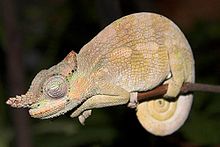Kinyongia tavetana
| Kinyongia tavetana | |
|---|---|

| |

| |
| Males (above active, below sleeping) | |
| Scientific classification | |
| Domain: | Eukaryota |
| Kingdom: | Animalia |
| Phylum: | Chordata |
| Class: | Reptilia |
| Order: | Squamata |
| Suborder: | Iguania |
| Family: | Chamaeleonidae |
| Genus: | Kinyongia |
| Species: | K. tavetana |
| Binomial name | |
| Kinyongia tavetana (Steindachner, 1891) | |

| |
| Synonyms | |
| |
Kinyongia tavetana, the Kilimanjaro two-horned chameleon or Kilimanjaro blade-horned chameleon, is a species of chameleon in the genus Kinyongia. It is native to forests, woodlands, well-wooded gardens and plantations in the highlands of southern Kenya and northern Tanzania.[1][2] Its type locality is Mount Kilimanjaro,[3] but it is also known from Chyulu Hills and Mount Meru to the Pare Mountains.[4]
Taxonomy
Until 1991 when they were split, K. tavetana was generally considered a subpopulation or subspecies of K. fischeri.[5]
In 2002, the subpopulation from Taita Hills in Kenya was described as a new subspecies, K. tavetana boehmei,[6] but in 2008 it was recommended that it instead should be recognized as a separate species, K. boehmei.[4]
Appearance
The species' reached up to c. 24 cm (9 in) in total length, with males growing larger than females. It varies in colour and pattern, partially depending on location and sex, but is generally various shades of brown, grey, green, yellow, red or blue. The adult male has a pair of diverging, blade-like "horns" on the nose, which are lacking in females.[2][4]
References
- ^ a b Tolley, K.; Menegon, M. (2014). "Kinyongia tavetana". IUCN Red List of Threatened Species. 2014: e.T172544A1344860. doi:10.2305/IUCN.UK.2014-3.RLTS.T172544A1344860.en. Retrieved 19 November 2021.
- ^ a b Spawls, S.; Howell, K.; Drewes, R.; Ashe, J. (2002). A Field Guide to the Reptiles of East Africa. Academic Press. pp. 236–237. ISBN 0-12-656470-1.
- ^ Kinyongia tavetana at the Reptarium.cz Reptile Database. Accessed 6 April 2014.
- ^ a b c Mariaux, J.; Lutzmann, N.; Stipala, J. (2008). "The two-horned chamaeleons of East Africa". Zoological Journal of the Linnean Society. 152 (2): 367–391. doi:10.1111/j.1096-3642.2007.00332.x.
- ^ Broadley, D.G.; Howell, K.M. (1991). "A check list of the reptiles of Tanzania, with synoptic keys". Syntarsus. 1: 1–70.
- ^ Lutzmann, N.; Nečas, N. (2002). "Zum Status von Bradypodion tavetanum (Steindachner, 1891) aus den Taita Hills, Kenia, mit Beschreibung einer neuen Unterart (Reptilia: Sauria: Chamaeleonidae)". Salamandra. 38 (1): 5–14.

